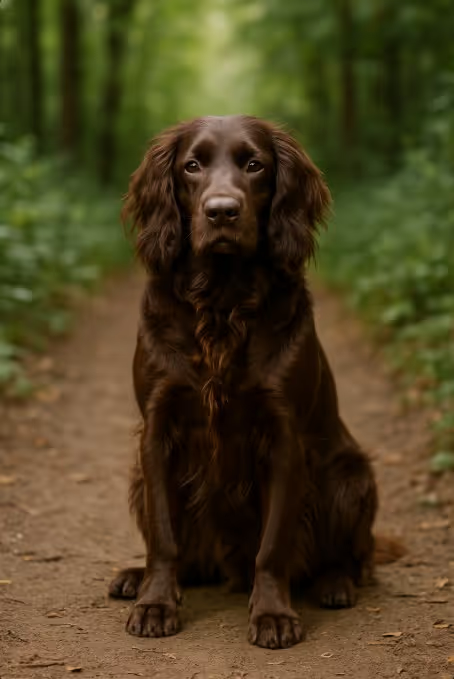The Field Spaniel is an affectionate, loyal, and thoughtful companion bred originally for fieldwork and now cherished for its even-tempered personality. Slightly more reserved than its cocker spaniel cousins, this breed thrives in calm households that provide plenty of mental stimulation and moderate daily exercise. With its silky coat and soulful eyes, the Field Spaniel is an excellent match for active families, dog sports enthusiasts, or those seeking a steady, trainable companion.

The Field Spaniel originated in England during the mid-1800s, bred to be a versatile gundog capable of flushing and retrieving game in dense cover. It was developed from various spaniel lines including the Cocker Spaniel and Sussex Spaniel. Over time, an emphasis on show traits led to exaggeration in size and shape, prompting a decline in working ability and popularity. In the 20th century, breed enthusiasts revived the Field Spaniel as a functional, moderate dog. It remains a rare breed, prized for its balanced nature and historical significance in spaniel development.
The Field Spaniel is a medium-sized dog with a noble bearing, long ears, and a glossy, waterproof coat.
Moderate grooming is required to maintain the Field Spaniel’s elegant coat.
The Field Spaniel needs consistent activity and enjoys having a job or purpose.
Intelligent and eager to please, the Field Spaniel is a quick learner when handled gently.
Balanced nutrition supports the Field Spaniel’s active body and coat health.
Field Spaniels are generally healthy, though they can be prone to a few inherited issues.
Due to their rarity, finding a Field Spaniel may take time, but the wait is worthwhile.
Are Field Spaniels good with kids?
Yes, when raised with children and well-socialized, they are gentle and affectionate.
Do Field Spaniels bark a lot?
No, they’re moderate barkers—typically only vocal when alerting or excited.
Are Field Spaniels rare in Canada?
Yes, they are considered a rare breed; litters may be limited and waitlists common.
Do they get along with other pets?
Usually yes, especially when introduced early—though they have a moderate prey drive.
Are Field Spaniels hypoallergenic?
No, they are not hypoallergenic and do shed seasonally.
How trainable are Field Spaniels?
Very trainable with consistent, positive methods; they enjoy learning and pleasing their people.
Do Field Spaniels need a yard?
A yard is helpful but not mandatory if they receive daily walks and mental stimulation.
Are they good off-leash?
With training and recall practice, yes—but their nose can lead them to wander.